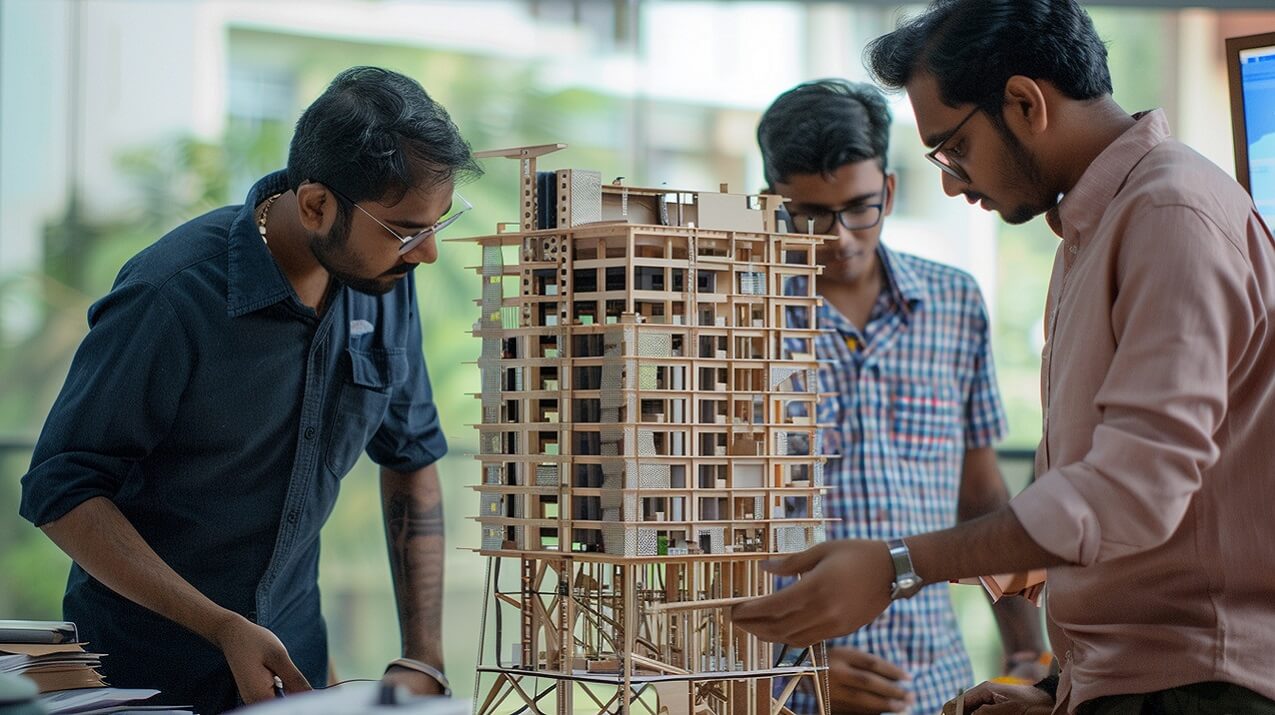Electrical & Electronics Engineering
- Home -
- Electrical & Electronics Engineering
Department Of Electrical & Electronics Engineering
Department of Electrical & Electronics Engineering integrates electrical and electronics disciplines, vital in modern technological advancements, covering power generation, utilization, and diverse applications across various fields.

Course Description
- Electrical deals with the various ways to effectively and efficiently use of electricity, its installation and maintenance
- Electronics deals with using and controlling electrical power to interpret an instruction and perform a desired task.
The diploma in Electrical and Electronics
Engineering covers two separate fields:-
Our course target is to train young minds and to equip them with the best possible technical knowledge in electrical and electronics domain to meet the current and future demands of the industry and prepare to run own business.
This program focuses on holistic development of students:
- Foundation build-up (basic knowledge of subjects)
- Core engineering subjects and technological knowledge
- Problem analysis skill
- Design/Development of solutions
- Modern tool usage
- Environment and sustainability
- Management personality development, ethics and communication
- Individual and teamwork
- Life-long learning
About Course
With the advent of technology and an ever-increasing dependence on devices that are meant to improve our standard of living, right from smartphones virtual and augmented reality to the newly found metaverse, the importance of chips, electronics, and electrical equipment is nowhere near the downward trend of the spiral curve. The importance of knowledge in the field will increase manifold in the years to come.
Given the growing importance of knowledge and intelligence with respect to electrical and electronics engineering, the demand from the student community to pursue this course is increasing by the day. Also, the demand for quality talent from the private industry and academia to improve research and development in the electrical and electronics space is always on the higher end of the spectrum.
With such a scenario in place, it is of no surprise that a diploma in electrical and electronics engineering is a fantastic career opportunity for a student to pursue early in their life.
Duration
- 6 Semesters ( 3 Years)
Specialization
- Electrical and Electronics Engineering (Diploma - EX) Intake: 60
Affiliation
- Affiliated to Rajiv Gandhi Proudyogiki Vishwavidyalaya Bhopal MP for Engineering And Engineering Diploma Courses.
Approval
- Approved by AICTE (All India Council for Technical Education) Ministry of HRD Govt. of India New Delhi.
Why diploma in Electrical and Electronics Engineering?
This is one field of study where there is immense scope of in-depth study. The core subjects here would include circuit technology, power engineering and instrumentation. Things like power engineering, transmission and distribution are also covered by such people. Control systems, which is the driving force behind all electrical and electronics systems is a fundamental paper here. Students from the diploma background in electrical and electronics engineering is the bridge between electrical and electronics sciences. Thus, students here study electrical subjects like power system as well as master electronics papers like microprocessor technology and communication systems.
A number of electrical design papers are also included as a part of the curriculum. For diploma courses, it is ensured that greater weightage is given to the practical application of the theoretical concepts that are taught in class. This ensures that the students graduating from this course are industrially equipped to take on the challenges of the modern scientific world.
Some key points
- Further Studies
- Job Opportunities
- Salary And Working Conditions
- Foreign Career Opportunities
Electrical and Electronics Engineering diploma students can choose to seek lateral entry to engineering courses like Electrical engineering, Electronics & Communication Engineering and Electrical and Electronics Engineering. In this manner, the four-year engineering course gets reduced to a three-year course for diploma holders. That way, they will have an upper edge over other students as they already know the basics of the core subjects.
Another career path for diploma holders is to do a postgraduate diploma in any of the a forementioned areas of specialisations. Doing so will land them with higher chances of bagging a job and, thereby, ending up with successful careers.
Following your diploma in Electrical and Electronics Engineering, you may choose to take up a job right away. A number of private and government organisations hire people from this background.
The top recruiters in the government sector include that of NEEPCO, SAIL, BHEL and NTPC. In the private sector, the most prominent recruiters would include Jindal Steel and Power Limited, Hindustan Motors, OMEGA elevators, L&T Construction and STEEL amongst others. Other than that, there are the electricity boards of the various states across the country and the hundreds of construction firms that hire people from the background of diploma in Electrical and Electronics Engineering.
For those who look forward to taking up a job directly after diploma school, the starting salary will depend on whether he or she is joining a government organisation or a private one. The average salary is Rs 14,000 per month. The PSUs, however, pay much higher. Most of the diploma holders in Electrical and Electronics Engineering have to work in factory conditions.
This naturally means rotational working hours with weekends being working days as well. Working conditions may be physically challenging and, hence, it is advisable that you take up this profession only if you are genuinely interested in this field.
The western world has a great demand for Indian electrical and electronics engineering diploma holders. The most common job profiles there for people with this qualification would include that of workshop-skilled labour, operations manager and engineering technologists.
With workers laws being stricter, the working conditions for diploma holders are much better there. The average salary there is about $48,000 per annum. Even in countries like China and Japan, there is a great demand for electrical and electronics engineering diploma holders. They are employed as the skilled workers and are highly valued by organisations.

Prof. Jitendra Singh Dodiya
Head of Department
Dear all Students,
Greetings from Vikrant Institute of Technology and Management!
Welcome to Vikrant Institute of Technology and Management, dedicated to providing quality education and research. In today's competitive landscape, with rapid technological advancements like 3D Printing, Nanotechnology, and AI, it's essential to continuously enhance your knowledge and skills. Effective communication, practical projects, innovation, and research are key to industry acceptance. With experienced faculty and excellent infrastructure, our institute nurtures student goals and fosters inspiration. Engage in extracurricular activities and industry interactions facilitated through our MoU's, preparing you for market leadership.
Let's collectively strive to generate ideas, knowledge, and future leaders while contributing to national development and improving quality of life. Best wishes for a fulfilling journey at Vikrant Institute of Technology and Management, Indore.
Good Luck and Good Wishes!!
Jai Hind and Jai Bharat!!!

Vijay Bisen
HOD/Asst. Professor
Neha Khatri
Asst. Professor
Suresh Panwar
Lab Instructor
Narendra Shinde
Lab Instructor
Some USP Features:
- Industry-Relevant Curriculum:
Our programs are designed in consultation with industry experts to ensure they align with the latest trends and technologies. We emphasize hands-on learning and practical experience, allowing our students to work on real-world projects and gain a deep understanding of electrical and electronics engineering principles.
- Experienced Faculty:
Our department boasts a team of experienced faculty members who bring a wealth of knowledge and industry experience to the classroom. They are committed to providing comprehensive guidance and mentorship, fostering an environment of intellectual growth and academic excellence.
- Placement Success:
We take pride in the success of our students, who have secured placements in prestigious private and government companies. Our alumni have been hired by renowned organizations such as Tata Consultancy Services (TCS), Infosys, Wipro, Larsen & Toubro (L&T), Bharat Heavy Electricals Limited (BHEL), Reliance Industries Limited, Mahindra & Mahindra, Larsen & Toubro Infotech (LTI), ABB India, and Siemens India. Our strong industry connections and dedicated placement cell play a crucial role in facilitating these opportunities.
- State-of-the-Art Infrastructure:
We understand the importance of practical training, and our department is equipped with state-of-the-art laboratories and facilities. From advanced electrical systems to cutting-edge electronics equipment, students have access to resources that enhance their practical skills and facilitate experiential learning.
- Research and Innovation:
We encourage research and innovation among our students. Through seminars, workshops, and research projects, we provide opportunities for them to explore emerging technologies and contribute to the advancement of the field.
Join us at the Department of Electrical and Electronics Engineering at Vikrant Institute of Technology and Management Indore, and embark on a transformative educational journey that will empower you to make a significant impact in the world of electrical and electronics engineering.
Related Courses
Civil Engineering
- Diploma CE
- Intake: 60
Mechanical Engineering
- Diploma - ME
- Intake: 120
Computer Science & Engg.
- B.Tech (CSE)
- Intake: 90
Information Technology
- B.Tech (IT)
- Intake: 30
Electronics & Communication
- B.Tech (EX)
- Intake: 60
Electrical & Electronics
- B.Tech (EX)
- Intake: 60
Mechanical Engineering
- B.Tech (ME)
- Intake: 120
Fire Technology and Safety
- B.Tech (FTSE)
- Intake: 60
Civil Engineering
- B.Tech (CE)
- Intake: 60
Computer Science & Engg.
- M.Tech - CSE
- Intake: 90
Cyber Security
- M.Tech- IT
- Intake: 60
Digital Communication
- M.Tech- DC
- Intake: 60
Production Engineering
- M.Tech- ME
- Intake: 120
Structural Engineering
- M.Tech- Structure
- Intake: 120














